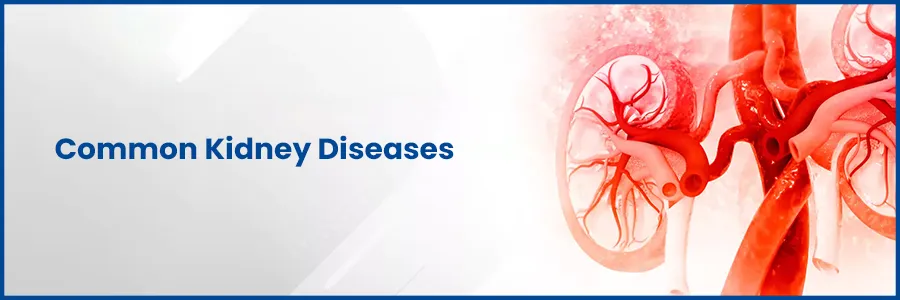- Cardiology 84
- Dermatology 45
- Endocrinology 33
- ENT 16
- Fertility 190
- Gastroenterology 78
- General-Medicine 81
- Gynecology 80
- Hematology 19
- Infectious-Diseases 33
- Neurology 52
- Oncology 34
- Ophthalmology 23
- Orthopedics 69
- Pediatrics 31
- Procedure 23
- Public-Health 144
- Pulmonology 59
- Radiology 8
- Urology 68
- Wellness 161
- Woman-and-child 77

What Are The Common Types of Kidney Diseases?
The kidneys play a vital role within the body, tasked with the responsibility of filtering out waste products from the blood, maintaining the balance of electrolytes, regulating blood pressure, and several other critical functions.
When kidneys become diseased or damaged, they may not function properly. This guide outlines the most common kidney diseases and their associated symptoms.
Functions of the Kidneys
- Blood Filtration: Daily, the kidneys sift through approximately 120-150 quarts of blood, yielding around 1-2 quarts of urine. Electrolyte Equilibrium: Playing a role in maintaining equilibrium, the kidneys aid in controlling the concentrations of sodium, potassium, and calcium in the bloodstream.
- Acid-Base Balance: They maintain a stable pH by regulating bicarbonate and hydrogen ion concentrations.
- Blood Pressure Regulation: By adjusting the volume of blood and the amount of sodium and other electrolytes.
- Regulation of Red Blood Cells: Erythropoietin, synthesized by the kidneys, triggers the bone marrow to generate red blood cells.
- Bone Health: They activate vitamin D, which helps the body absorb calcium.
Types of Common Kidney Diseases
Here is the list of kidney diseases
- Chronic Kidney Disease (CKD): Gradual loss of kidney function over time.
- Abrupt Kidney Impairment (AKI): A sudden reduction in kidney functionality.
- Polycystic Kidney Disease (PKD): Genetic disorder causing multiple cysts in the kidneys.
- Glomerulonephritis: Inflammation of the tiny filtering units called glomeruli.
- Kidney Stones: Solid formations in the kidney due to crystallized minerals and salts.
- Kidney Infections (Pyelonephritis): Typically caused by bacteria entering from the bladder.
- Nephrotic Syndrome: A condition where the kidneys excrete too much protein in the urine.
Secure your health with a second opinion. Make informed decisions and book your appointment today!
Get A Second OpinionThe treatment and management approaches for each type may vary based on the underlying cause and the severity of the condition.
Kidney Disease Symptoms
While symptoms can vary depending on the specific disease, some common signs of kidney diseases include:
- Changes in urination frequency or color
- Fatigue or weakness
- Swelling in hands, feet, or face
- Skin rashes or itchiness
- Vomiting and Nausea
- Shortness of breath
- Metallic taste in the mouth
- High blood pressure
Diagnosis and Treatment for Kidney Diseases
The diagnosis of kidney disease usually involves:
- Blood Tests: To measure creatinine and BUN (blood urea nitrogen) levels.
- Urine Tests: To detect protein, blood, or signs of infection.
- Imaging Tests: Like ultrasounds or CT scans.
- Renal Biopsy: A portion of kidney tissue is analyzed using a microscope.
Treatment depends on the specific kidney disease and its stage. It may involve:
- Medications
- Dietary changes
- Dialysis
- Kidney transplant
Ready to take control of your health journey? Book your appointment now and start your path towards wellness today!
Book an AppointmentHow Kidney Diseases Can Be Prevented
- Regular check-ups
- Managing conditions like diabetes and hypertension
- Maintaining a healthy weight
- Reducing salt intake
- Avoiding overuse of over-the-counter painkillers
- Staying hydrated
- Acute Post-streptococcal Glomerulonephritis: Occurs after a strep throat or skin infection.
- Rapidly Progressive Glomerulonephritis: Kidney function deteriorates in days or weeks.
- Membranous Glomerulonephritis: Due to the thickening of the glomerular basement membrane.
- Chronic Glomerulonephritis: Slow, progressive loss of kidney function over several years.
- IgA Nephropathy: Caused by deposits of the protein IgA in the kidneys.
Conclusion
Kidneys are vital organs that filter waste, regulate blood pressure, and filter waste. Common kidney diseases include CKD, AKI, Glomerulonephritis, PKD, and kidney stones, each requiring different treatments, such as medications, dialysis, or transplantation.
Early detection is key, so watch for symptoms like changes in urination or swelling. To maintain kidney health, prioritize regular check-ups, manage health conditions, and live a healthy lifestyle.
Frequently Asked Questions
The course can be slowed or stopped with early detection and treatment of kidney disease, but many types are chronic and require ongoing management to prevent complications. End-stage kidney failure may require dialysis or kidney transplantation.
A kidney-friendly diet typically includes reducing salt intake, limiting phosphorus and potassium-rich foods (if advised), moderating protein intake, and staying hydrated with water.
Monitoring depends on individual risk factors and any existing kidney conditions. Those at risk (diabetics, hypertensives, family history) may need regular kidney function tests, such as blood tests and urine analysis.
Yes, you may promote general kidney health and lower the risk of renal disease progression by avoiding excessive alcohol intake, controlling stress, getting enough sleep, and keeping regular physical exercise.
Yes, urinary tract infections (UTIs) and kidney infections (pyelonephritis) can lead to kidney damage if untreated or recurrent. Antibiotic therapy must be started as soon as possible to avoid problems.

- Cardiology 2132
- Dermatology 168
- Endocrinology 135
- ENT 97
- Fertility 217
- Gastroenterology 232
- General 478
- General-Medicine 1685
- Gynecology 169
- Hematology 85
- Infectious-Diseases 208
- Neurology 207
- Oncology 345
- Ophthalmology 65
- Orthopedics 187
- Pediatrics 83
- Procedure 72
- Public-Health 209
- Pulmonology 126
- Radiology 13
- Second Opinion 311
- Urology 294
- Wellness 600
- Woman-and-child 447
- Others 10217
Related Blogs
If you have any questions, please fill out the enquiry form or call us, and we will get back to you promptly.
040-68334455